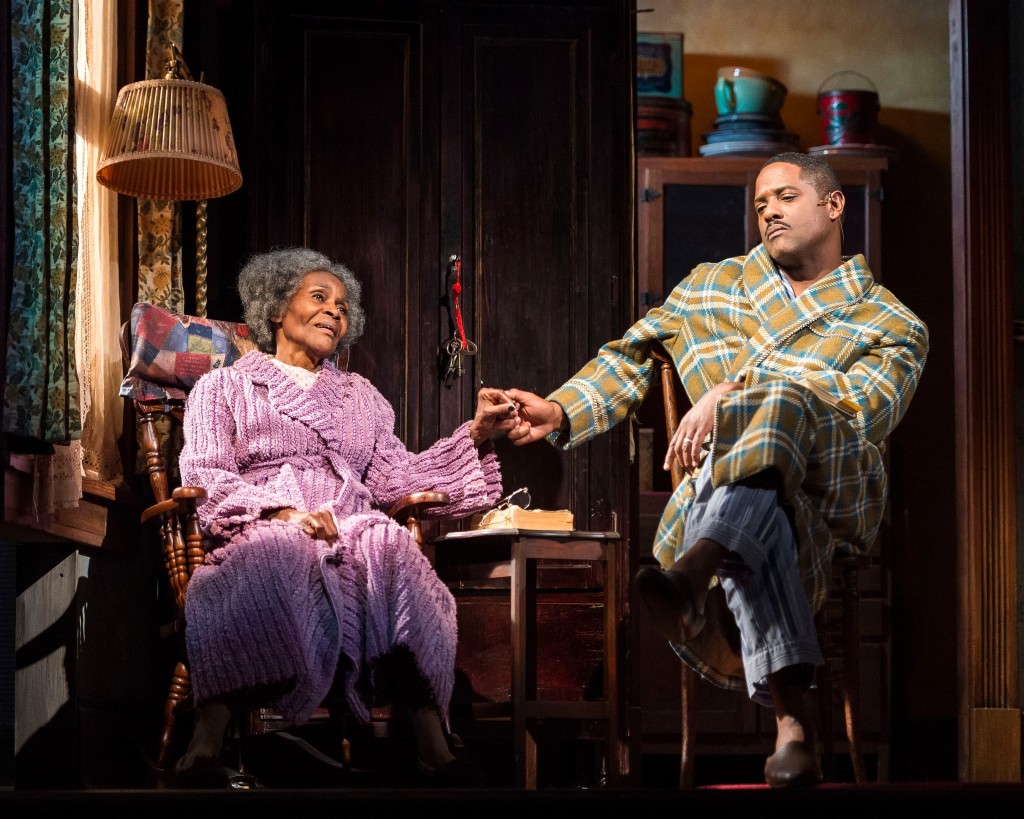Any life of a certain duration is full of large and small migrations. The good and the bad. And anyone over 50 can appreciate that the rapid societal changes we’ve sustained in the last 60 years have made for larger than normal earthquakes in our personal memories. Watching the splendid revival on the Ahmanson stage of The Trip to Bountiful, perhaps Horton Foote’s most poignant play, is like dipping a toe into the essence of nostalgia.
This production rightly won high praise last year on Broadway and a Best Actress Tony® Award for Cicely Tyson in the role of Carrie Watts. While The Trip to Bountiful was never intended to belong to one race or another (it emerged in 1953 as a teleplay about a white Texan family, and was later refashioned in the same vein for stage and film), fine writing proves colorblind. It makes a seamless transition in this incarnation from a Caucasian family to an African American one because, when we get down to basics, we’re all one under that epidermis.
Carrie, a widow in her 90s, lives with her son Ludie (Blair Underwood) and daughter-in-law, Jessie Mae (Vanessa Williams) in a stultifying two-room apartment in 1953 Houston. (There is not enough physical space for the three of them in Jeff Cowie’s nicely claustrophobic setting, let alone psychological room.) Other than plundering Mother Watts’ pension checks for visits to the beauty parlor and her daily drugstore Coca-Colas, living with Mother Watts is not Jessie Mae’s idea of an ideal arrangement.

Neither is it that of Mother Watts, who has but one desire and that is to flee the city and revisit the little Texas town of Bountiful, where she spent her youth and happiest years. She’s pleaded for Ludie to take her there only to be put off. When she resolves to make a break for it, and even when the results are not quite what she’d anticipated, the flood of conflict, emotional revelations and eventual resolutions make the way forward somehow more possible for this family.
It’s a simple story, but so eloquently distilled by Foote’s genius for depicting the minutiae of the human condition that it can’t help but trigger a flood of universal connections.
Tyson manages the treacherous path between the seemingly frail and shuffling old lady who almost wills herself to vanish from view when diminished by Jessie Mae’s continual scolding. But watch her when she’s left to her own devices, singing the hymns that sustain her (and Jessie Mae despises) and displaying the courage it takes to pick up and head for the bus station with not much more than an old suitcase and a will of steel. Her befriending of a young military wife (a nicely understated Jurnee Smollett-Bell as the tenderhearted Thelma) and her unquestioned expectation of kindness from strangers almost miraculously get where her she wants to go.

Call the play old-fashioned — it is — and that is elemental to its big rewards. Foote is a poet of the human species and there is something deeply satisfying about watching the grit and tunnel vision of his Carrie Watts, the “rightness” in her yearning to revisit home that is such a fundamental if unattainable craving. We know the impossibility of reliving the past will stop her, as will the transformations in the vanished world she pines for. But Tyson as this wily, bent over old lady, who dismisses rejection and ignores defeat and makes it all the way to the goal post with not much more than pluck, is a triumphant display of the human spirit at its best.
As we watch her teach a hymn and then a dance to her accidental traveling companion, Thelma, we see a rejuvenated woman. It makes you want to join in. Rejecting out of hand a sheriff’s refusal to help her reminds us that nothing is ever entirely out of reach. And the hell-bent outcome of her journey, for all of its outward disappointments, still nourishes that thing within that needed feeding.
The outward trappings of this production enhance it by simply being an integral part of its landscape. Paul Huntley’s hair styles and Van Broughton Ramsey’s 50s costumes pay meticulous attention to period detail, and Rui Rita’s lighting captures not only the wide clear skies of Bountiful when we finally get there, but also the crampness of the Houston household (including the windows of disapproving neighbors that light up when small battles rage in the Watts apartment).
Director Michael Wilson’s fine tuning never allows the play to slip into sentimentality — a built-in peril. His best assist comes from Tyson who never crosses that line. But credit must be shared by everyone for keeping things subtle and honest. Blair Underwood’s Ludie conveys an innate goodness, patience and dignity in a role that could otherwise easily be seen as weak. Yet the biggest surprise is Williams’ Jessie Mae. She may be nagging, shrill and callow, but now and then she lets us glimpse a heart inside, a heart nearly destroyed by an absence of self-knowledge. We may not appreciate her conduct, but we do not hate her either.
This play, like Thornton Wilder’s Our Town, has an inspired timelessness that draws us into an idealized America, where doors are left unlocked and dreams seem more attainable. It all may be moot in the end, but going on the journey is the prize.
WHAT: The Trip to Bountiful
WHERE: Ahmanson Theatre at the Music Center, 135 N. Grand Ave., Los Angeles, CA 90012
WHEN: Tuesdays-Fridays, 8pm; Saturdays, 2 & 8pm; Sundays, 1pm. Through Nov. 2
HOW: Tickets $25-$115, available at the Ahmanson Theatre box office or at 213.972.4400 or online at www.centertheatregroup.org
Top photo: (l-r) Cicely Tyson, Blair Underwood and Vanessa Williams in THE TRIP TO BOUNTIFUL
All photos by Craig Schwartz
